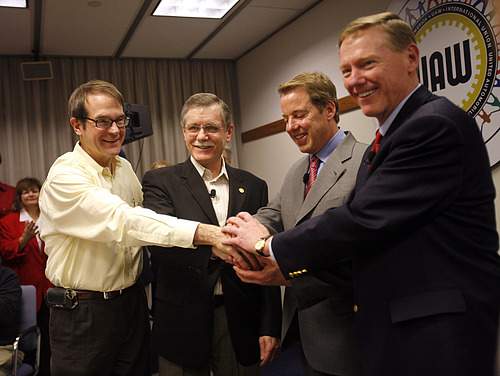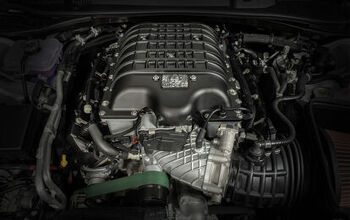Is Bill Ford Strapped for Cash?
Crazy Henry’s heirs and descendants own enough “special class B” stock to control 40 percent of the automaker’s shareholder votes. Translation: Ford owns Ford. While the Ford family isn’t down to its last $100m, the automaker’s plummeting fortunes must be more than slightly worrying. The last time Fortune checked-in with Ford family finances– April ’07– the Blue Oval Boyz and Girlz lost a cool (if paper) $581m. This after Ford suspended payments (September ’06). The last time TTAC checked-in with Bill Ford’s wallet, the FoMoCo Chairman had “modified” his pledge not to take a dime from his employer until it was back in black (a 2008 then 2009 prophecy that’s long since been abandoned). Ford (the failed CEO) agreed to defer (rather than forgo) the compensation until Ford (the failing company) returned to profitability. As the undisclosed bounty piles up, Billy may have something of a liquidity problem. Reuters reports that he’s unloaded one million shares of Ford common stock [not class B] to pay down debt that he took on to exercise options and acquire stock in the automaker in 2004 and 2005. “Ford sold the shares at an average weighted sale price of $5.05 on Thursday and continues to hold more than 5.3 million shares of common stock in the automaker, according to a filing on Friday with the U.S. Securities and Exchange Commission.” All credit to Bill for investing in his own optimism. But here’s a question: when Chrysler and GM file for C11, will Ford follow suit? If so, it will mean the end of Ford family control.
More by Robert Farago


































Comments
Join the conversation
I can't see how the Fords will allow a bankruptcy of their own company if they are holding so many shares of the stock.
Highrpm: One doesn't "allow" a bankruptcy. One files for it when one doesn't have a choice, usually just before one's creditors file a different form of bankruptcy to have your company assets taken away and sold to the highest bidder to pay bills you haven't been able to pay. Mortgaging every physical and intellectual property titled to Ford, as they did a few years ago, was the Ford family strategy to "not allow" bankruptcy. At the time, they had to have accepted that it would take two full product cycles to see if that bet was a winner. Like most of the people in the world, no way they could have foreseen the Second Great Oil Spike, or the collapse of the real estate and banking markets. These calamities have destroyed sales in North America for Ford and the other D2.8, exascerbating the biggest problem for all the companies in the auto industry, including their suppliers: Cash flow. Right now, Ford is the only remaining member of the D2.7 with a plan, as RUNFROMCHENEY cleverly points out. Ford's other advantage is their capital structure....the Family controls the board. Which is why they were able to wrangle together support for Mullaley and put together his plan so (relatively, for the Big 2.7) quickly....they did not have to wrestle with a board of directors, many with outside (not to say, necessarily, conflicting) interests and points-of-view. Ford's ability to stave off ignominious failure depends on the ability of their management to choke off a cash hemorrhage long enough for a.) new European-style models to come to the market and b.)the economy in North America to wobble back into some sort of stability, so that consumers and lenders can regain confidence enough to start buying cars again. Then they must hope that the market finds their vehicles attractive and reliable enough to actually buy. Ford may actually be helped by a GM or Chryberus C11 or C7, from which as a result they may gain some domestic sales volume. (Corporate darwinism and canabalism among the Big 2.7! Film at 11:00!) So, instead of the 2 product cycle time window they may have thought they had, in reality, given their current cash burn, they're down to one product cycle. Now they must hope that their new products come out of the box like a rocket. Quality truly must be Job One. The Irony for the Ford Family is that, although they individually will never have to wait for the next paycheck to make the car payment, they are vicariously, through their company, learning what it means to live "payday to payday", like many of the rest of us do. That is why the Ford family-driven capital structure is, also ironically, currently an advantage (where frequently in the past it may have been a dis-advantage)....financial crises tend to quell family squabbles and make contentious family members fall in line behind stronger leadership...blood is thicker than old school ties. One more point about Hank the Duece and his supposedly fabled auto industry chops: In the late 60's, he and Iacocca got into a famous snit. The disagreement was about many other issues, but manifest itself into a pissing contest about the final design of the 1970 Thunderbird. Iacocca wanted a flatter, more graceful front-end face. Il Duece was so pissed at Lido, that he insisted upon the 8 inch proboscis extension on the front grill and hood. So, Hank's chops notwithstanding, his ego gave Ford one of the most misbegotten and ugliest vehicles they ever made, as well as denying FoMoCo the services of arguably one of the most capable auto executives in the industry's history. I believe that Ford (not GM) is now the economy's mythical canary in the coalmine. GM and Chrysler have each thrown credibility and their business overboard and are not recoverable. Ford has a plan. If the economy starts to recover, Ford has a viable chance. If.
@RunfromCheney: love the underpants gnomes reference!